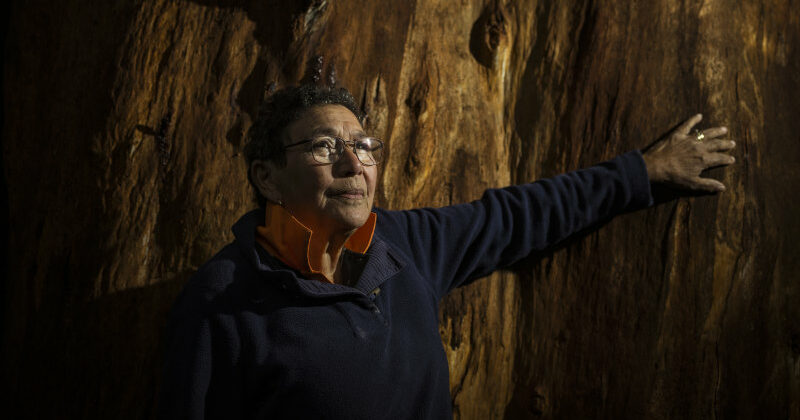Save articles for later
Add articles to your saved list and come back to them any time.
Kurnai elder Aunty Cheryl Drayton is on a mission to make clear to her local community in the Victorian electorate of Monash that she will be voting No in the Voice referendum and that they should do the same.
Drayton is not affiliated with the No campaign, nor is she a member of a political party. But she is fiercely opposed to the Voice, unconvinced by the arguments of Yes advocates that it will empower grassroots communities when there is little detail about how it will operate.
Aunty Cherly Drayton plans to vote No in the Indigenous Voice to parliament referendum.Credit: Chris Hopkins
“While there’s no meat on the bone of how this is going to work, I can’t see how any normal person with a brain could vote for it,” Drayton, 71, said.
One person persuaded by Drayton is Monash MP Russell Broadbent. The veteran Liberal MP had long been an outspoken supporter of the Voice, and even contributed to a book published earlier this year in which he argued a rejection of the proposal would “impoverish” the country.
“It’s a matter of me keeping my integrity. I can’t say one thing – that I’m listening to Indigenous people – and then go and do another,” Broadbent said, explaining why he would now vote No.
“The basis for me changing my position was this woman sitting there and saying to me: ‘we are the Indigenous people in your community. You said you wanted to hear from us. You said you would listen to us’.”
Russell Broadbent was a long-time supporter of the Voice to parliament, until Drayton changed his mind.Credit: Alex Ellinghausen
Drayton has spent five decades working in Aboriginal affairs across education, health and employment roles in west Gippsland region, which begins at the south-eastern fringes of Melbourne. She argues there is inadequate detail on how the Voice is going to work.
“It doesn’t tell them how people are going to get elected [on to the Voice]. The government has thrown a lot of money at this and it could have been spent developing communities’ aspirations,” she said.
“I don’t trust the government in any way shape or form and that’s why I’m voting No.”
She acknowledged that there are other Kurnai elders who are voting Yes, including her sister. Meanwhile, another clan in the Gippsland area, the Gunaikurnai people, has issued a statement through their local representative body endorsing the Voice.
As the Yes and No campaigns ramp up their targeting of “soft” and undecided voters ahead of referendum day on October 14, the views of grassroots Aboriginal people like Drayton are providing powerful advocacy for Australians wanting to base their vote on the wishes of Indigenous people.
Labor and the Yes23 campaign routinely reference polling that they maintain shows more than 80 per cent of Indigenous Australians support the referendum, and promote endorsements from local Aboriginal leaders across their social media pages.
Indigenous Australians Minister Linda Burney has repeatedly emphasised that “the idea of the Voice comes from Aboriginal and Torres Strait Islander people themselves, not from government”, and referred to the consultation process that led up to the 2017 Uluru Statement from the Heart, signed by more than 250 Indigenous leaders, calling for a constitutional Voice.
In its bid to dismantle this portrayal of consensus, No campaign outfit Fair Australia – led by Coalition frontbencher Jacinta Nampijinpa Price – has been quick to seize on any media coverage portraying dissenting views among Indigenous leaders about the Voice. It has repackaged soundbites as shareable content across its social media pages with the message that the referendum is promoting division.
In the western NSW electorate of Parkes, which comprises almost half of the state, Nationals MP Mark Coulton represents one of the largest Aboriginal constituencies of any seat in the parliament.
The Nationals were widely criticised for adopting a party position opposing the Voice in late 2022, long before the referendum process had been finalised. Coulton chaired the party subcommittee that advised the party to take a No position, and said his personal view was informed by discussions with local Aboriginal leaders who opposed the Voice in his community.
“They reinforced my own view, which was that they are much more inclined to want to support more local leadership. They don’t have very good memories of [former Indigenous representative body] ATSIC and they don’t have a lot of faith in who will be actually on the Voice,” Coulton said.
“Having said that, there are some people who I’m very fond of and who I admire who are very strong Yes voters.”
One such person is Wiradjuri elder and former Dubbo deputy mayor Rod Towney, one of the signatories of Uluru Statement From the Heart, who is disappointed by Coulton’s position, and believes it does not reflect the majority view of his Aboriginal constituents.
“I believe there is strong support among Aboriginal people for it [the Voice]. But I would like to see more information given to grassroots people. They’ve still got questions,” Towney, who has no political affiliations, said.
Among the No voters reinforcing Coulton’s thinking is Peter Gibbs, a Gamillaroi man, National Party member, and community leader from Dubbo who holds the polar opposite view to Towney, his friend.
“I live and work in the NSW western region and travel extensively and I can tell you there is not strong support for the Voice among Aboriginal and non-Aboriginal people,” Gibbs said.
“I know that the ATSIC model was a failure that did not deliver positive outcomes for Indigenous Australians, and that the Voice to parliament would be a similar experiment.”
Cut through the noise of federal politics with news, views and expert analysis. Subscribers can sign up to our weekly Inside Politics newsletter here.
Most Viewed in Politics
From our partners
Source: Read Full Article


